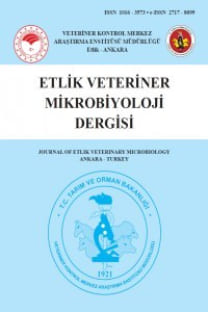Türkiye'deki Köpeklerin Oral Yolla Aşılanmasının Uygulanabilirliği - Avrupa Birliği Destekli Proje
Köpek, Oral Aşı, Aşı, 1998, Winfried MÜLLER, Tülin GÜZEL, Orhan AYLAN, Canan KAYA, Jim COX, Lothar SCHNEIDER
The feasibility of oral vaccination of dogs in Turkey- a European Union supported Project
Köpek, Oral Aşı, Aşı, 1998, Winfried MÜLLER, Tülin GÜZEL, Orhan AYLAN, Canan KAYA, Jim COX, Lothar SCHNEIDER,
___
Bingham J, Foggin CM, Gerher H, Hill FWG, Kappeler H, King AA, Perry BD, W andeler AI (1 992) Pathogenicity of SAD rabies vaccine given orally in chacma baboons (Papo ursinus). Vet. Rec .. 131:55-56Cox JH, Schneider LG (1976) Prophylactic immunization of humans against rabies by intraderınal inoculation of human diploid cell culture vaccine. J . Clin. Micro., 3:96-101.
Mattter HC, Kharmachi H, Haddad N, Ben Yussuf S, Sghaier C, Ben Khelifa R, Jemli J, Mrabet L, Meslin F-X, Wandeler AI (1995) Test of three baits for oral immunization of dogs against rabies in Tunisia. Am. J. Trop. Med. Hyg .. 52: 489-495.
Matter HC, Fico R, Neuenschwander BE ( 1998) Study of the structure and density of a dog population in Tekirdağ (Turkey) . J . Etlik Vet. Microbiol.. 9:9-24
Müller WW ( 1996) Review of Reporteel Rabies Case Data in Europe to the WHO Collaborating Centre Tübingen from 1977 to 1996. Rabies Bulletin Europe, 20(4):11-18.
Schneider LG, Cox JH ( 1983) Ein Feldversuch zur oralen Immunisierung von Füchsen gegen die Tollwut in der Bunclesrepublik Deutschlancl. I. Unschacllichkeit. Wirksamkeit und Stabilitat eler Vakzine SAD 819. Tierarztl. Umschau. 38:315-324.
WHO ( 1992) WHO Expert Committee on Rabies. 8th Report - WHO Technical Report Series 824, World Health Organization. Geneva
WHO (1993). Report of the fourth WHO consultation on oral immunization of dogs against rabies . WHO/Rab.Res./93.42. World Health Organization. Geneva
- ISSN: 1016-3573
- Yayın Aralığı: Yılda 2 Sayı
- Başlangıç: 1960
- Yayıncı: Veteriner Kontrol Merkez Araştırma Enstitüsü Müdürlüğü
SAD B19'un Türk Köpeklerindeki Etkinlik Çalışmaları
SAD B19'un Türkiye'de Hedef Dışı Türlerdeki Zararsızlık Testleri
Tülin GÜZEL, Orhan AYLAN, Ad VOS
Bait İşaretleyici Olarak Clenbuterol: Köpeklere Bait'lerin Verilişi
Andreas GLEIXNER, Orhan AYLAN, Heinrich MEYER, Ad VOS
Türkiye'de / İstanbul'da Köpek Populasyonuna Yönelik Çalışma
Tekirdağ'da Köpek Populasyonunun Yoğunluğu ve Yapısı Üzerine Çalışma
Hans MATTER, Rosario FİCO, Beat E. NEUENSCHWANDER
Türkiye'de Köpeklerin Kuduza Karşı Oral Aşılamasında Bait Dağıtım Sisteminin Değerlendirilmesi
Türk Köpeklerinde SAD B19'un Zararsızlık Testleri
Orhan AYLAN, İsmet YÖRÜK, Hikmet ÜN
Tekirdağ'da Köpek Populasyonunun Yoğunluğu ve Yapısı Üzerine Çalışma
Hans MATTER, Rosario FİCO, Beat E. NEUENSCHWANDER
Türkiye'deki Köpeklerin Oral Yolla Aşılanmasının Uygulanabilirliği - Avrupa Birliği Destekli Proje
Winfried MÜLLER, Tülin GÜZEL, Orhan AYLAN, Canan KAYA, Jim COX, Lothar SCHNEIDER
